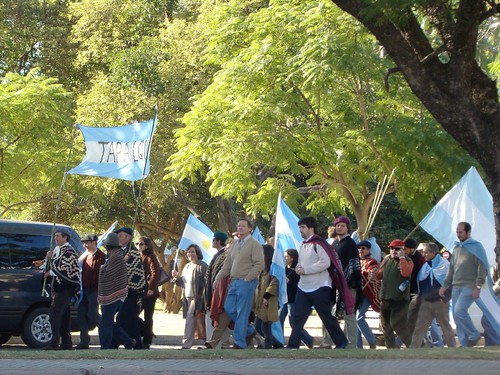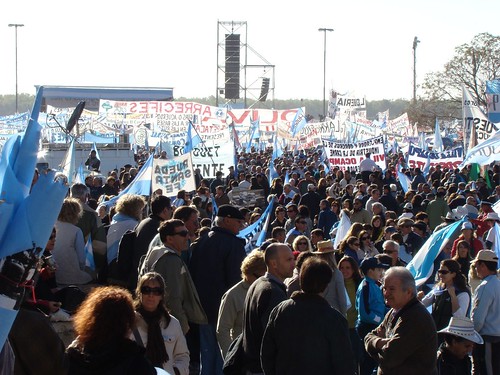26 May 2008
May 25: the people's meeting in Rosario, and Kirchner's show in Salta
Yesterday, May 25, the campo held its meeting here in Rosario, at the Flag Memorial. The four main agricultural organizations and many others called for people to come from all corners of the country. Although the initial protest was triggered by the increase of the tax export on soybean, the government handled it so badly it ended up turning it into a movement that demands global changes in all areas: differential tax exports, subsidies or tax exemptions for local production, help for smaller producers to avoid the concentration of land, a comprehensive policy for agriculture and livestock farming, and a general change in the style of government of the Kirchners.
Marisa and I had arranged to have breakfast at 8 AM with the Rosarigasinos and four visiting photographers coming to Rosario via Buenos Aires, at a bar located on Belgrano Ave., which comes from the south and leads to the Flag Memorial. That's where the attendants to the campo's meeting were coming. The morning was cold but the wind was mercifully calm. Even at so early a time, we saw bus after big bus bringing people to the meeting, plus tractor trucks old and new, plus cars, and people marching on foot with Argentine flags, banners and signs.
We took our breakfast and then went out to check out the masses. The morning was splendid; the air was filled with expectation, and tens of thousands of white and sky-blue flags were flying. We took a detour around the back of the Flag Memorial to avoid the greatest concentration of people and heard the announcer over the loudspeaker, thanking the attendants and reading the banners with the names of the places where they'd come from. Many were from small towns in Santa Fe, some of which I'd never heard about before; many from the superproductive area of southern Santa Fe and southern Córdoba, but also people from the drier north, from Chaco, Entre Ríos, Corrientes, from the rich lands of north and central Buenos Aires, from Tucumán and Salta in the far northwest, and from Neuquén and Río Negro in the southwest. There were whole families and many older couples, plus heterogeneous groups marching together. Every time the announcer read the name of a town there was a roar coming up from some place or other in the crowd.
I took a lot of pictures and some video, but I didn't stay for the speeches. Our visitors followed us down Belgrano Ave., along which people continued to arrive past the police barricades. There was a rumour that the organizers wanted to start early because then President Cristina Kirchner would be speaking on the official TV channel, which requires all others to cut off their broadcasting. I don't know what became of that, but I learned later that Cristina, presiding the celebration in Salta, spoke for only 14 minutes in front of a crowd formed by a majority of people who were paid to be brought and planted there to applaud her.
Cristina's crowd waved banners with political legends or signs noting who had paid for them to come — Kirchnerist mayors and union leaders who always need to display their loyalty to whoever's in charge to continue receiving their pay. I didn't even bother to listen to Cristina's speech later; in any case, her diction and style are so irritating, and her every sentence so full of pretense, that I can't stand her for more than five seconds.
Our meeting (the one in Rosario were the people came by their own will and only waved Argentine flags) gathered 200,000 people according to the police, or more like 300,000 according to the organizers. There wasn't a single incident or disturbance among the attendants or towards other people or the host city. Kirchner's disgracefully political meeting gathered 150,000 according to the government, although the police said it was more like 70,000 (we know how the Kirchners love to tweak numbers in their favour...), and as seems to have become customary in Peronist meetings, some tough guys from the truck drivers' union (whose leader sat near Cristina) engaged in a brawl with some other tough guys paid to attend by the Kirchnerist government of Tucumán.
The coverage: the openly Kirchnerist Página/12 and its child Rosario/12, the local La Capital, the also local, unfortunately titled Rosario3, the outraged conservative La Nación, the arch-enemy of everything that's good, Clarín, and the BBC.
I have more to say about this (you were fearing that, weren't you) but I'll shut up for today.
Subscribe to:
Post Comments (Atom)


















No comments:
Post a Comment
Note: Only a member of this blog may post a comment.